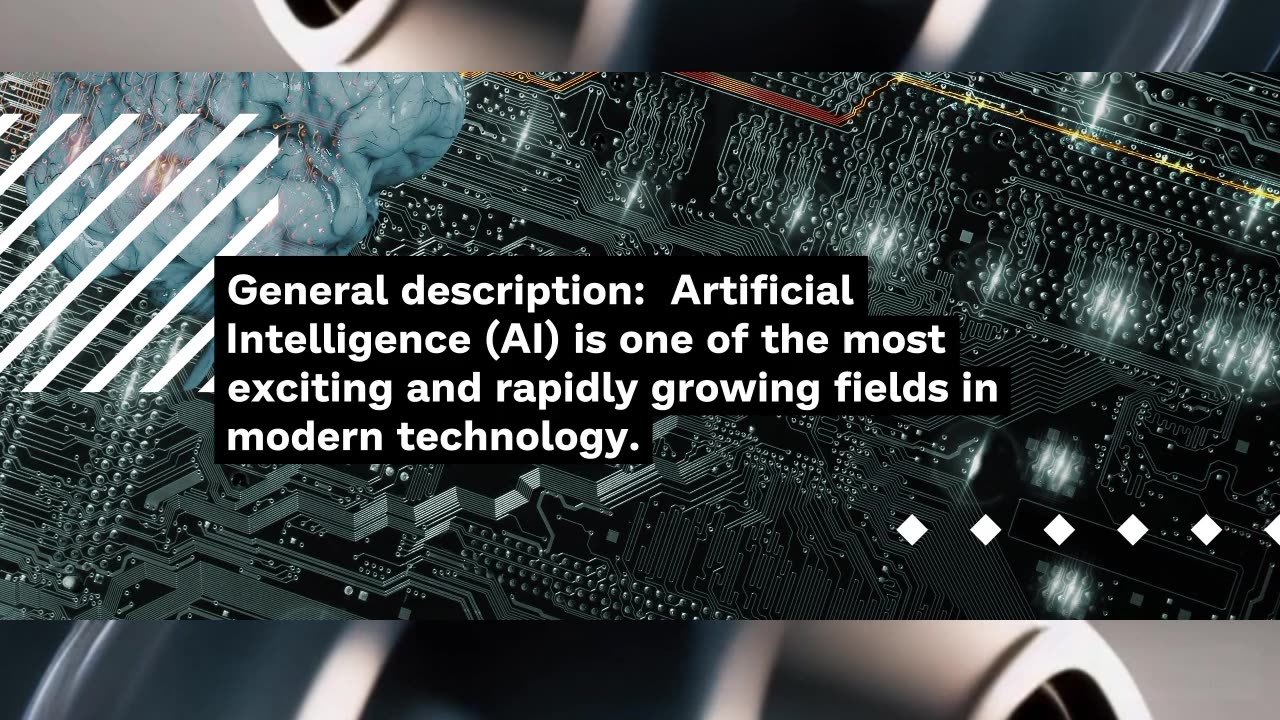Premium Only Content

Artificial Intelligence: Getting to Know the World of AI
Artificial Intelligence (AI) is one of the most exciting and rapidly growing fields in modern technology. This refers to the ability of a computer or machine to perform tasks that normally require human intelligence. In this material, we will discuss the basics of AI, the latest developments, and its impact on various fields.
Part 1: Introduction to AI
1. What is AI?
- AI is a branch of computer science that focuses on developing computer systems that can perform tasks that require human understanding, such as speech recognition, computer vision, and complex problem solving.
2. History of AI
- AI first became known in the 1950s with the development of computer programs that could play chess.
- The development of AI has experienced a huge surge in the last few decades thanks to advances in computer technology and algorithms.
Part 2: Types of AI
1. Weak AI (Narrow AI):
- Weak AI is limited to certain tasks, such as chatbots or facial recognition.
- They do not have a broad understanding of the context and cannot switch between tasks smoothly.
2. Strong AI (Strong AI):
- Strong AI is AI that has human-like abilities to understand, learn, and think in general.
- This is still a long-term goal in AI development.
Part 3: Recent Developments in AI
1. Deep Learning:
- Deep learning is a branch of AI that uses multi-layer artificial neural networks to process data.
- It has led to major advances in image recognition, natural language, and strategy games.
2. AI in Disease Cure:
- AI is used in medical scanning to detect disease, as well as in the development of more effective drugs and treatments.
3. Autonomous Vehicles:
- AI is used in the development of autonomous cars that can drive without human intervention.
Part 4: Impact of AI
1. Jobs and Automation:
- The rise of AI has raised concerns about replacing human jobs by machines.
- However, this also opens up new opportunities in AI-related jobs.
2. Security and Ethics:
- Cybersecurity and privacy issues are increasingly important with the development of AI.
- The ethics of using AI, such as its use in the military field, is also a topic of debate.
3. Human-Machine Cooperation:
- AI can also improve human abilities in problem solving and decision making.
- Human and machine collaboration will be key to optimizing the potential of AI.
Part 5: The Future of AI
1. Increasingly Integrated AI:
- AI will be increasingly integrated into everyday life through smart devices, smart homes and other applications.
2. AI and Creativity:
- The use of AI in art, music and writing will continue to grow.
- AI will help create more interesting and varied content.
3. AI and Longevity:
- AI can be used in medical research to understand and combat aging-related diseases.
- It can also help in health care and disease prevention.
Conclusion: Challenges and Opportunities
The development of AI is one of the most exciting technological achievements in history, bringing enormous opportunities in various aspects of life. However, this also comes with ethical, security, and social challenges that need to be addressed wisely as we continue to explore and harness the potential of AI.
-
 8:36:11
8:36:11
Dr Disrespect
11 hours ago🔴LIVE - DR DISRESPECT - DELTA FORCE - INTENSE SITUATIONS ONLY!
204K26 -
 4:01:30
4:01:30
Nerdrotic
8 hours ago $25.17 earnedHollywood National DISASTER! Studios Terrified, Star Wars FAIL | Friday Night Tights 336 w Raz0rfist
108K33 -

Edge of Wonder
7 hours agoLA Fires: Biblical Inferno as Hollywood Burned Down
15.5K4 -
 12:35
12:35
China Uncensored
6 hours agoHas the Coverup Already Begun?
34.4K27 -
 1:09:12
1:09:12
The Big Mig™
9 hours agoLet’s Talk Music “Karmageddon” w/ Iyah May
21.4K7 -
 1:00:22
1:00:22
Sarah Westall
4 hours agoLoss of Confidence in the Medical System, Real Facts and Data w/ Dr. Michael Schwartz
29.9K5 -
 55:08
55:08
LFA TV
1 day agoThe Cause of ‘Natural’ Disasters | TRUMPET DAILY 1.10.25 7pm
25.3K8 -
 1:38:11
1:38:11
2 MIKES LIVE
4 hours ago2 MIKES LIVE #165 Open Mike Friday with Special Surprise Guests!
15.3K2 -
 1:01:18
1:01:18
PMG
1 day ago $1.06 earnedIs the UK Grooming Issue Alive in America & How Are Those DEI Fire Policies Working in CA?
21.2K3 -
 2:01:49
2:01:49
Revenge of the Cis
7 hours agoEpisode 1428: Who Did This?!
33.7K6